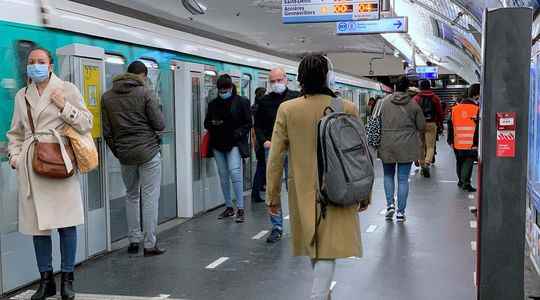France is raising one of the last ramparts against the epidemic, more than two years after its arrival in Europe. Travelers will no longer have to wear a mask in public transport from Monday May 16, as declared by the Minister of Health Olivier Véran at the exit of the Council of Ministers, Wednesday May 11. Are concerned: the subway, the bus, the train, the plane and the taxis. Shortly after this statement, the European Aviation Safety Agency (EASA) announced the lifting from Monday of the obligation to wear a mask at airports and on board planes throughout the European Union.
If the restrictions fall like dominoes, it is because the executive brandishes the context of the decline of the Covid-19 epidemic, even if it is probably not over. “The situation is improving,” summarized the Minister of Health, while, for more than a month, contaminations and hospitalizations are finally falling after a very long winter wave. The daily average of new infections over seven days was 31,151 on Saturday May 14, compared to 38,216 the previous Saturday.
This drop is also confirmed in the hospital since 20,346 Covid patients were hospitalized, against 21,920 a week earlier. Health indicators that are turning green again due to the protection of the population by vaccination (78.3% have a complete vaccination schedule) and the relatively low dangerousness of the Omicron variant, which appeared at the end of 2021. But on the the epidemic, the Covid-19 still kills a hundred people every day, enough to question the need for this decision. Among the first to worry, immunocompromised people who represent 40% of people in intensive care after contracting Covid-19.
“The lifting of the mask is too early, especially since everyone is now used to it. It would have been better to wait until August to see how the situation would evolve”, comments to L’Express Hervé Fleury, virologist and professor emeritus at the CNRS, attached to the virology laboratory of the Bordeaux University Hospital. In France, the Minister of Health insists that wearing a mask remains “recommended”, but the reality should resemble the consequences of relief in supermarkets or cinemas where most people return with their faces uncovered. Thus, several researchers call for vigilance and warn against an excessive feeling of security, especially in the face of the threat of a new variant.
“We are not immune to a new wave”
If we turn our gaze abroad, southern Africa and the United States are experiencing yet another resurgence of the epidemic fueled by new strains of Omicron. In South Africa, the increase in contaminations would find its origin in the appearance of the BA.4 and BA.5 variants, which follow BA.1, BA.2 and BA.3. Hervé Fleury warns: “We are not immune to a new wave, perhaps not very pathogenic, from South Africa.” Statements that echo the warning issued by the European Center for Disease Prevention and Control (ECDC) on Friday, May 13, explaining that Omicron subvariants could “lead to a significant overall increase in cases of Covid-19. 19 in the EU in the coming weeks and months”.
Thus, respect for barrier gestures remains recommended because the risks of transmission are higher once the masks are removed in transport. “The transmission of Covid-19 is by aerosols and the virus can remain in the aerosols for at least thirty minutes / one hour. For example, when people have the virus in the nasal cavity, they exhale – at the time of breathing – microdroplets on which the virus remains suspended in the air”, details Hervé Fleury. Another recommendation that may seem obvious: keep wearing a mask if you are sick.
Although the epidemic is losing ground, the political agenda raises questions. “What is the scientific interest of this decision? For me, it coincides with the start of the second five-year term and it bothers me that the disease becomes a political decision”, reacts Benjamin Davido, infectious disease specialist at Raymond-Poincaré hospital. The specialist would have liked the fall of these facial protections to be defined by health indicators. “Personally, I think that we should have waited, for example, for the 10,000 contaminations per day level (…) France would undoubtedly have reached this objective within the next fortnight… With the end of the obligation of masks, we risk slowing down a favorable dynamic.
“We could have waited until mid-June to avoid mixing”
It should be noted that transport represented 1.2% of contamination clusters in October 2020 according to Public Health France. These figures were to be taken with a grain of salt, due to the difficulty of identifying sources of contamination in these places. These data could evolve with the end of the wearing of the mask: “There will inevitably be involuntary contaminations. We could have waited until mid-June so that there are fewer people in transport and therefore avoid mixing. ”
In recent months, the government had already loosened the screw on health restrictions, with the end in March of wearing a mask except in transport, and of the vaccination pass, which required being vaccinated against Covid to access many places. such as restaurants and cinemas. Faced with these changes, a handful of measures are resisting: the wearing of a mask and the presentation of the health pass in health establishments, except in emergency situations, the still compulsory isolation for people tested positive and the obligation vaccine still in force for certain professions.
Olivier Véran mentioned the possibility of a new vaccination reminder campaign in the fall, but refrained from giving any details, stressing that everything would depend on the appearance of new variants and their more or less dangerous profile or resistant to existing vaccines.
